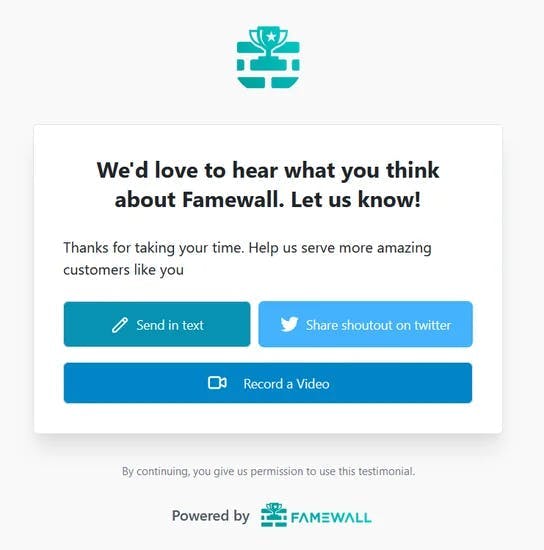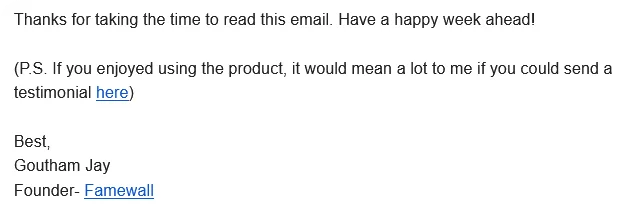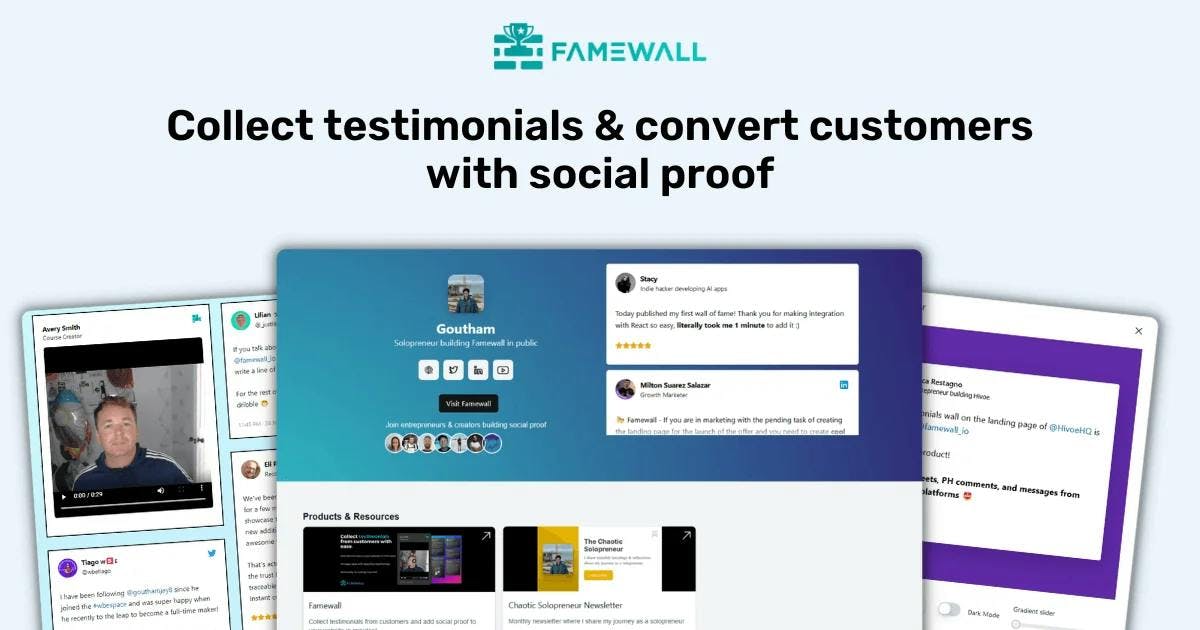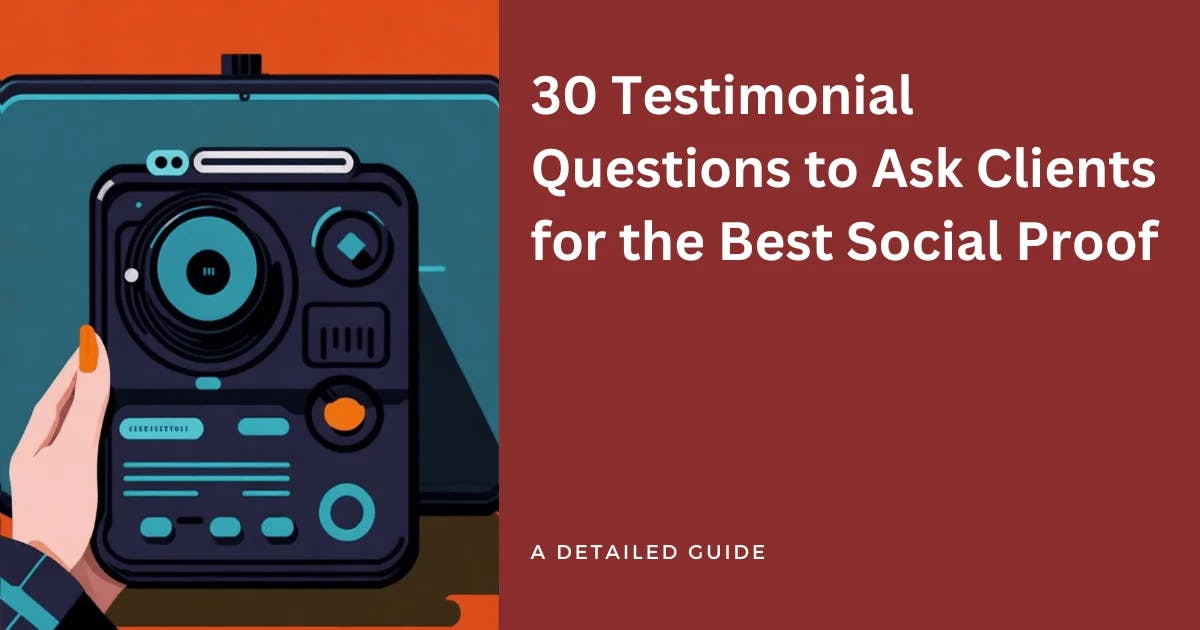How long should I wait before asking for a testimonial?
How Long Is the Right Time to Ask for a Testimonial?
When it comes to marketing, testimonials are one of the most powerful tools to attract new customers by showing satisfied customers. And we're all aware of the power of testimonials to reach potential customers, build trust, and increase conversions.
So, when should you ask for a testimonial? Well, for starters, the question is "How long is the right time to ask for a testimonial?"
Here's the answer you came for:
TLDR; 3 ideal moments to ask for a testimonial
- It's better to ask for a text testimonial once they complete the checkout of your product
- Ask for a testimonial with a prompt once they reach the "Aha" moment with your product/service
- Wait 1-2 hours after purchase to ask for a video testimonial
Clear the fundamentals - What are Testimonials?
Just to clear things up if you've never heard of testimonials before. Testimonials are written or video reviews from customers who have used your product or service. They are usually positive words about the product/service.
They are a form of social proof that reinforces the credibility of your brand and product. They are often used on websites, in emails, and in other marketing materials to convert customers on the fences.
The Right Time to Ask for a Testimonial
So, how long do you wait before asking for a testimonial? It depends. There's no hard and fast rule on when you could ask for a testimonial. But here are some times that have worked for Famewall's customers.
Ideally, you want to wait until your customers have had enough time to use your product or service and form a good impression about it.
And we know for a fact that customers who complete a purchase of your product, are already excited to stick with you and have invested their interests in you. So you can send a testimonial request to them with a prompt on your website once they complete the checkout
Video testimonial takes special effort from the customer. So you can try waiting for 1-2 hours after your customer makes a purchase and send the video request via email
Customers are 50% more likely to send you a video testimonial if you give them personalized attention before asking for one.
Good examples of these would be when you go on a video meeting with them and ask for a testimonial at the end or ask for one after delighting the customer by resolving a support request
You can easily collect testimonials from your customers by using Famewall to create a testimonial collection form and share it as a link through which customers can send you testimonials
Here's the sample collection form

This guide walks you through the process of collecting testimonials from your customers
If customers haven't responded to your testimonial requests on the first attempt, wait for a few days (3-4 days) and then ask for testimonial requests once they've realized the value from your product or service
It's also a good idea to append testimonial requests at the end of your email campaigns

Testimonial Request at the end of Emails
You can have a look at these 17 testimonial email templates to use when requesting a testimonial via email
At the end of the day, it’s important to remember that you want to get the best testimonials possible. That means waiting until customers have had enough time to experience your product or service and form an opinion about it.
Factors to Consider When Asking for a Testimonial
When asking for a testimonial, there are a few factors to consider.
First, you want to make sure you’re asking the right people. You want to make sure you’re asking customers who are genuinely satisfied with your product or service. That way, you’ll get the most authentic testimonials and help you with conversion
Second, you want to make sure you’re asking the right questions. You want to ask questions that will elicit positive responses. For example, you may want to ask questions like
- "What was the problem you faced?"
- “How has our product or service helped you?”
- “What do you like best about our product or service?”
Finally, you want to make sure you’re asking at the right time. As we discussed above, you want to make sure you’re asking customers after they’ve had enough time to use your product or service and realize its value.
To help you get started, here are 30 testimonial questions you can ask your customers to get the best social proof
Best Practices for Asking for Testimonials
When asking for a testimonial, there are a few best practices to keep in mind.
First, you want to make sure you’re following up with customers in a timely manner. You don’t want to wait too long, as customers may forget about your product or service. At the same time, you don’t want to ask too soon, as customers may not have had enough time to experience your product or service.
Second, you want to make sure you’re asking in the right way. You want to make sure you’re asking in a way that feels natural and not too pushy. For example, you may want to start by thanking customers for their purchase and asking if they would be willing to provide a testimonial.
There are a few ideal moments when you want to ask for a testimonial from your customer
Third, you might want to try offering incentives. Offering incentives can be a great way to encourage customers to provide a testimonial. For example, you could offer a discount on their next purchase in exchange for a video testimonial.
Finally, you want to make sure you’re making it as easy as possible for customers to provide a testimonial. You may want to provide customers with a link to an online form where they can easily leave their testimonial.
Here Famewall comes to your rescue with the testimonial collection page
A Few Tips When Asking for Testimonials
When asking for a testimonial, there are a few tips to keep in mind.
If you're sending the request via email or support chat, you want to make sure you’re personalizing your request. You want to make sure you’re addressing customers by name and thanking them for their purchase. This will make customers feel appreciated and more likely to provide a testimonial.
You want to make sure you’re offering a clear call to action. You want to make sure customers know exactly what you’re asking them to do and how they can do it. It's best to use a testimonial collection form as there's less friction when customers would like to send you a testimonial
Finally, you want to make sure you’re following up with customers. There's the sweet spot in following up where you don’t wait too long, as customers may forget about your request. At the same time, you don’t want to follow up too soon, as customers would find it pushy and might not have had enough time to use your product.
How to Follow Up on Testimonials
When following up on testimonials, there are a few tips to keep in mind.
First, you want to make sure you’re thanking customers for their time and effort. You want to make sure customers feel appreciated and that their time is valued.
Second, you want to ensure you’re providing customers with the necessary information. This would include everything they need to provide a testimonial, such as the questions to answer, a place where they can submit a testimonial etc.
If they haven't responded to your follow-ups, try offering incentives. Offering incentives can be a great way to encourage customers to provide a testimonial.
Tools to Make Asking for Testimonials Easier
There are plenty of tools that can make asking for testimonials easier.
A simple tool to get started would be using a Google Form where customers can submit testimonials and relevant contact information. But the problem with this approach is that it gets tedious for you to maintain it & you wouldn't be able to get video testimonials this way as customers would have to manually upload them to Google Drive.
There are customer feedback tools that can help you capture customer feedback and make it easier to ask for testimonials. These tools can help you capture customer feedback quickly and easily and make all the testimonials available in a single dashboard.
Famewall is one such tool you can use.
You can then use the captured testimonials for your marketing campaigns or Ad campaigns as shown in this guide
There are survey tools that can help you create surveys and collect customer feedback. These tools can help you create surveys that are tailored to your customers and make it easier to get the information you need.
Then there are email marketing tools that can help you create and send emails to customers with testimonial requests. Customers send you a text testimonial via a reply to this email.
Here too, the drawback is that there's a lot of hassle for customers if they have to send a video testimonial and it becomes difficult for you as a business owner to manage testimonials
Conclusion
Asking for a testimonial can be a great way to increase trust, reach more potential customers, and increase conversions. However, it’s important to make sure you’re asking at the right time and in the right way.
The right time to ask for a testimonial depends on the type of product or service you offer. Ideally, you want to wait until customers have had enough time to experience your product or service and form an opinion about it.
When asking for a testimonial, there are a few best practices to keep in mind. You want to make sure you’re following up with customers in a timely manner, asking in the right way, offering incentives, and making it as easy as possible for customers to provide a testimonial.
Finally, there are plenty of tools that can make asking for testimonials easier. These tools can help you capture customer feedback quickly
So, how long is the right time to ask for a testimonial? It depends. But with the right strategies and tools mentioned in this article, you can make sure you’re asking at the right time and getting the most impactful testimonials possible.
Try Famewall for free to start collecting testimonials from customers & display them as social proof on your websites without writing any code



